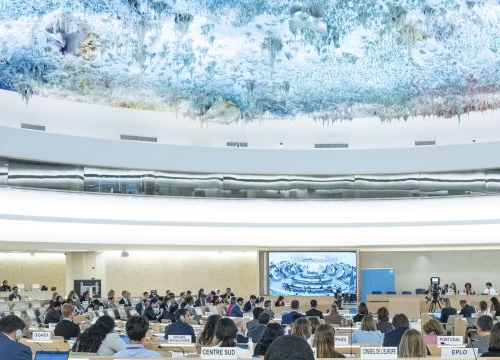Executive course for Diplomats: Leading in the Human Rights Council


UN Photo/Jean-Marc Ferré
An Executive Course for Geneva-Based Diplomats on UN Human Rights Mechanisms
This executive course, tailored for Geneva-based diplomats and co-organized with the support of the Swiss FDFA, addresses the negotiation practices at the multilateral level, by taking the United Nations (UN) Human Rights Council (HRC) as an example of formal and informal negotiation and decision-making processes by an international intergovernmental body.
Negotiation processes and voting of resolutions and decisions are among the most sophisticated and developed processes in today’s UN system. These processes involve not only states, who are the main players and the only ones entitled to vote but also UN agencies – like the Office of the High Commissioner for Human Rights (OHCHR), which acts as the HRC substantive and logistical secretariat –, independent experts such as Special Rapporteurs or members of fact-finding missions or commissions of inquiry, as well as civil society actors.
Programme
Leveraging our extensive network of international experts and practitioners, this executive training delivers to Geneva-based diplomats profound and pragmatic insights into multilateralism and the functioning of the HRC. The course is meticulously crafted to balance theoretical depth with practical application, ensuring relevance and immediate utility for participants. It is tailored to suit the needs of the audience, with content continuously adapted throughout the course to ensure it aligns with participants' expectations.
Diplomats will gain a strong understanding of the HRC’s formal rules and procedures while developing the tools and strategies required for effective leadership in multilateral settings. In particular, participants will gain essential skills such as drafting resolutions, negotiation techniques, and managing interactions with regional and political groups active in the negotiating area of the Human Rights Council. These competencies are comfortably acquired by the conclusion of the training. Furthermore, the training facilitates meaningful connections among participants and with the organizers, fostering opportunities for ongoing collaboration on matters of mutual significance.
The course will cover the following issues:
- Overview of the IB package and the evolution of the HRC’s frameworks, with linkages to broader UN processes such as the UN General Assembly, environmental COPs, and others.
- Detailed exploration of mechanisms including the Universal Periodic Review (UPR), Fact-Finding Missions, Commissions of Inquiry, Special Procedures, and UN Human Rights Treaty Bodies, alongside the OHCHR’s critical role as secretariat and human rights focal point across the UN system.
- Thematic resolutions—how and why they are selected and adopted, with tangible examples from recent negotiations
- The UPR, highlighting its significance as the "jewel in the crown" and its vital role in the work of Geneva-based human rights diplomats.
- Strategies for enhancing efficiency within the HRC, including innovative solutions for reporting, monitoring, and evaluation.
- Moderated discussions with special guest speakers who bring unique perspectives from the field of human rights diplomacy.
- A final simulation exercise designed to encourage critical thinking, provoke meaningful discussions, and solidify participants’ learning outcomes.
Objectives
By the end of the course, participants will:
- Master the operations, rationale, and interconnections of the HRC, UPR, and other UN mechanisms.
- Gain proficiency in drafting resolutions, negotiating effectively, and managing interactions with all relevant stakeholders.
- Develop leadership qualities and strategic thinking to address challenges within the HRC and beyond.
- Build valuable professional networks with peers and international experts, fostering ongoing collaboration.
Exclusive Features
Participants will receive personalized feedback throughout the course, engaging with seasoned trainers in a challenging yet supportive environment. The program emphasizes active learning, ensuring participants leave with practical skills and strategies ready for immediate application in their diplomatic roles.
Methodology
The course adopts an interactive and participatory approach, blending illustrated lectures, multimedia resources, discussions, and hands-on exercises. Participants will receive preparatory reading materials to maximize engagement during the sessions.
Audience
This training is designed for newly Geneva-based diplomats with less than 1 year of experience at their missions. Only one diplomat per mission will be admitted, ensuring a focused and impactful learning experience. Organizers are committed to ensuring gender and regional diversity.
Enrolment is capped at 18 participants to ensure tailored attention and an engaging experience. Participants must attend at least 80% of the sessions to earn the final certificate.
Access to a Dedicated Community Platform
All participants in our training course have access – ahead, during and following their course – to a dedicated community platform (on Mighty Network). This community brings together all the participants to our courses who have unlimited access to the training materials and resources shared during their course and can exchange with all the alumni of the Geneva Human Rights Platform Training Hub.
Lecturers
The training course will be led by Kamelia Kemileva, the Co-Director of the Global Cities Hub, that promotes city diplomacy at the UN and a Senior Consultant to AxLR Ltd, a Geneva-based private company. Her policy research and publications focus on the functioning of the UN system, multilateral diplomacy and selected topics in international law.
Certification
Participants who successfully complete the training course receive a certificate of participation from the Geneva Academy.
Fee
This training is supported by the Swiss FDFA and is provided free of charge for newly Geneva-based diplomats.
How to Apply
Applications must be submitted via this online application form.
If you have questions, do not hesitate to contact us: traininghub[at]geneva-academy.ch








